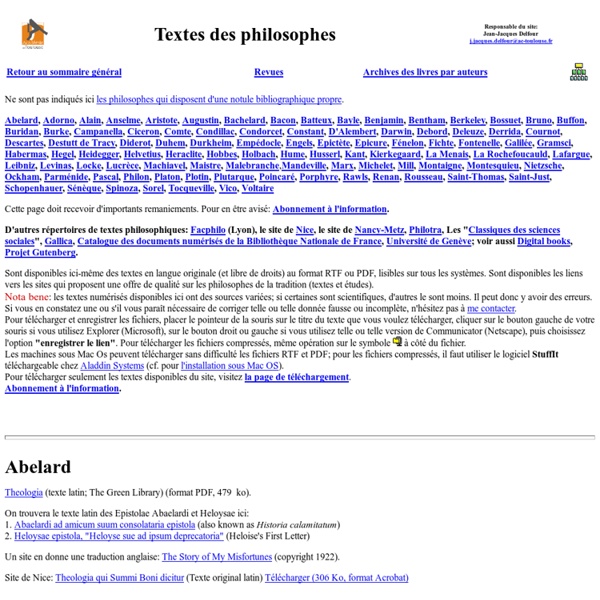



Librairie Philosophique J. VRIN Philosophie et spiritualité Utilisation des données personnelles Envoi d’e-mailings personnalisés SFR peut utiliser vos informations personnelles pour vous proposer des offres adaptées, directement sur le site SFR.fr ou lors de communications par e-mails. Gestion des cookies Lors de la navigation sur le site SFR, des cookies sont implantés dans votre navigateur. Nous vous informons que vous pouvez vous opposer à l'enregistrement de cookies en configurant votre navigateur de la manière suivante : Pour Microsoft Internet Explorer :1. Gestion des cookies de publicité ciblée de nos partenaires Des sociétés partenaires (gérant des serveurs de publicité ou des réseaux de sites) peuvent utiliser des cookies ou des technologies assimilées dans le cadre de la délivrance de publicités ciblées sur le stite SFR. Vous avez la possibilité de vous opposer à ce que la publicité affichée lors de votre navigation ne soit plus ciblée. Mémorisation de votre identifiant de connexion:
Philagora, ressources culturelles Français Librairie l'éternel retour Invitation à la philosophie Stanford Encyclopedia of Philosophy Philo L'éternité n'est pas tant dans le temps que le temps n'est dans l'éternité. Malebranche, Entretiens sur la métaphysique. Commentez cette citation. L'éternité n'est pas tant dans le temps que le temps n'est dans l'éternité. Malebranche, Entretiens sur la métaphysique. Commentez cette citation. Dissertations Commentaires Citations Fiches de lecture POUR LE SUJET: L'homme est-il réellement libre ? << Aussi, quoique nous ne nous souvenions pas d' ...Le mystère des choses est la source de toute L'éternité n'est pas tant dans le temps que le temps n'est dans l'éternité. Citation Signaler un abus administration Ajouter au panierAbonnementEchange gratuit Corrigé non disponible Le corrigé du sujet "L'éternité n'est pas tant dans le temps que le temps n'est dans l'éternité. Sujets connexes : Derniers corrigés ajoutés : Les derniers sujets consultés : tant pas temps entretiens n'est sur Afficher les ressources gratuites Problématique Ajoutez une PROBLEMATIQUE pour le sujet : L'éternité n'est pas tant dans le temps que le temps n'est dans l'éternité. Plan détaillé Textes / Ouvrages de référence Citations Ajouté par webmaster Quelle est la couleur de la tomate ?
Philosophical Quotes, Thought-Provoking Sayings Related Quotes Hmmm Philosophy Truth Wise Words We are more often treacherous through weakness than through calculation. ~François VI de la Rochefoucault A man with one watch knows what time it is; a man with two watches is never quite sure. ~Lee Segall Begin at the beginning... and go on till you come to the end: then stop. Believe those who are seeking the truth; doubt those who find it. Beware lest you lose the substance by grasping at the shadow. Only that in you which is me can hear what I'm saying. I am a part of all that I have met. There's more to the truth than just the facts. The obscure we see eventually. Even a clock that does not work is right twice a day. Losing an illusion makes you wiser than finding a truth. If a man who cannot count finds a four-leaf clover, is he lucky? We are all but recent leaves on the same old tree of life and if this life has adapted itself to new functions and conditions, it uses the same old basic principles over and over again. You are the sky.
Citations sur l'écriture - La boîte à inspiration Créer un site gratuitement Close La boîte à inspiration Conseils en écriture Citations sur l'écriture Faits divers Livres inspirateurs d'écriture Liens vidéo Liens écriture Citations sur l'écriture Créer un site gratuit avec e-monsite - Signaler un contenu illicite sur ce site A PHILOSOPHY OF LIFE by Sigmund Freud Sigmund Freud (1932) Lecture XXXV A Philosophy of Life Source: New Introductory Lectures on Psycho-analysis (1933) publ. Hogarth Press. LADIES AND GENTLEMEN – In the last lecture we were occupied with trivial everyday affairs, with putting, as it were, our modest house in order. ‘Weltanschauung’ is, I am afraid, a specifically German notion, which it would be difficult to translate into a foreign language. If that is what is meant by a Weltanschauung, then the question is an easy one for psychoanalysis to answer. This objection cannot be too strongly repudiated. This does not at all imply that we need push these wishes contemptuously aside, or under-estimate their value in the lives of human beings. From the point of view of science we must necessarily make use of our critical powers in this direction, and not be afraid to reject and deny. Of the three forces which can dispute the position of science, religion alone is a really serious enemy.
Portal:Philosophy